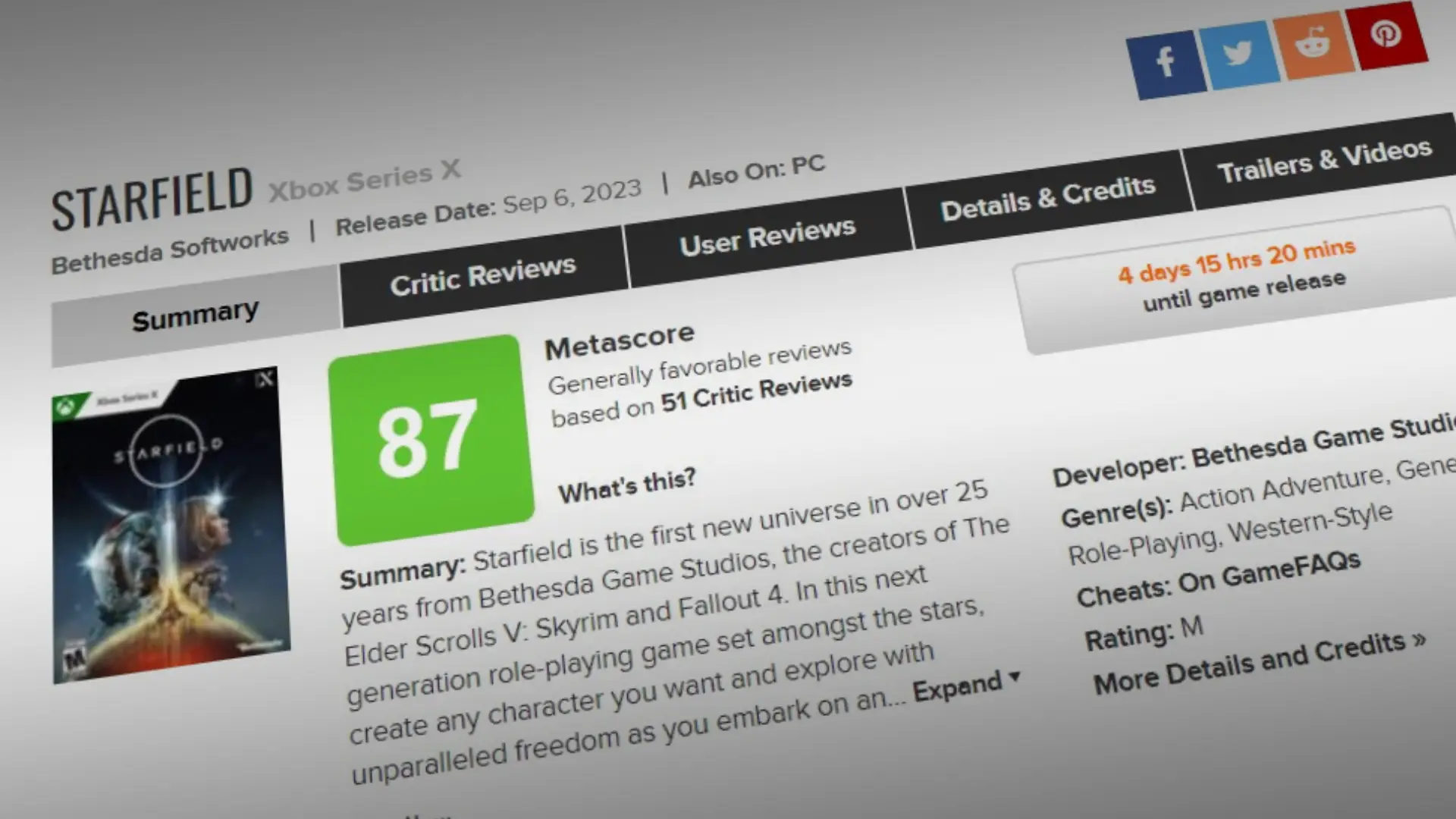
With Starfield once again sparking debate over review scores, Vikki asks: should the industry stop equating success with an arbitrary figure on a website?
I deleted Xitter from my phone tonight. No, it wasn’t Musk and his astonishingly anti-consumer practices that finally drove me to hit x on X. It was The Discourse. The cyclical, semi-annual, endless back and forth about review scores and the impact – both positive and negative – they have on the games industry.
For those who may have missed it (oh, how I envy you), the current hoo-hah erupted in the wake of Starfield’s release. Reviews dropped yesterday, and Bethesda’s all-new sci-fi adventure is currently sitting on an aggregated critic score of 87 on Xbox Series X, and 88 on PC, making it the 32nd highest-reviewed game of 2023 (although that is heavily caveated by news that Bethesda seems to have been a little choosy when disseminating advance codes to reviewers, and so the early scores have primarily originated from Xbox-focused sites, and a lot, but certainly not all, of UK sites didn’t make the cut, either. Make of that what you will).
Bethesda can do whatever the hell it wants to with its codes, of course. No one site or individual is entitled to early access if a publisher doesn’t want them to have it, and it stands to reason that if the PR team thinks a site may tank its Metacritic – a score that, rightly or wrongly (and I definitely think its the latter), is often attached to developer and/or c-suite bonuses – then they’ll be a little choosy. I don’t hold that against anyone, just as I hope developers, in turn, don’t hold a grudge against me for the times their games may not have been positively received by me.
I’ve been reviewing games for a loooong time now, and I’ve written for a whole host of places. Some sites and magazines have scored their reviews for many happy years. Some have not. Some have moved between the two, experimenting with both. As a critic with fifteen-odd years under her belt, I, somewhat unhelpfully, don’t have a strong preference for one over the other. Like most things in life, there are pros and cons to both – the key here is applying your scoring criteria consistently for each outlet.
Just as every writer is different – and every gamer is different – so too are the sites we write for. Some score out of 10, some score out of 5, some use a star system that may or may not permit half-stars (this site scores out of a 100 in a nod to old magazines like Amiga Power), and that’s why most places have a review guide of some description that details what these numerical scores mean. For most, 5/10 – or whatever that site’s equivalent is – equates to a completely average, bog-standard game, with 6/10+ above average, and 4/10 and below sub-par. Theoretically, anyway.
The trouble is, even though most other entertainment mediums have gotten on just fine with this numerical system for ages, game scores have become inflated over the years. So even though by pretty much every other metric in the world, a 5/10 or 2.5/5 is a perfectly acceptable, average score, when it comes to gaming, 7/10 is seen as average… and 5/10 has somehow become the kind of score that can close a studio down.
For example, I’m an emotional gamer. I care about the people I meet in games, the stories they tell, and the worlds I explore, and that’s why my reviews often focus on how a game makes me feel above all else. Whether it lasted two hours or 102, was it a good use of my time? Did it surprise me, in good ways or bad? Was I simultaneously both desperate to reach the end yet desperately sad to finish? When the credits rolled, did my fingers itch to restart the adventure all over again?
The emotions I feel when playing a game are always the scaffold upon which I base the rest of my criticism. Surprised, frustrated, angry, amused – however a game makes me feel, it sits at the centre of my experience, both tainting or cleansing the rest of my adventure. But that’s just part of it. The sounds, the visuals, the mechanics, the storyline, the characters, the puzzles, the control scheme – they’re all part of it, too. Just like a game is always a greater sum than its disparate parts, so too are our reviews.
And that’s why most of us take a great deal of care when selecting what score to award a game because, in isolation – unsupported by supplementary commentary and evidence – video game scores can feel cold at best, and reductive at worst. But as long as players’ eyes are drawn immediately to a number at the bottom of the page, and bonuses are tied to an arbitrary figure on a single website, it feels like we’ll never stamp out the emphasis put on review scores, regardless of how hard publishers try to massage the odds, or how hard critics try to exemplify why they’ve given that score in the text above. And I’m still absolutely flummoxed on how we, as an industry, begin fixing this.
Vikki Blake has a column every week here at whynow Gaming. You can read her previous dispatch here.





